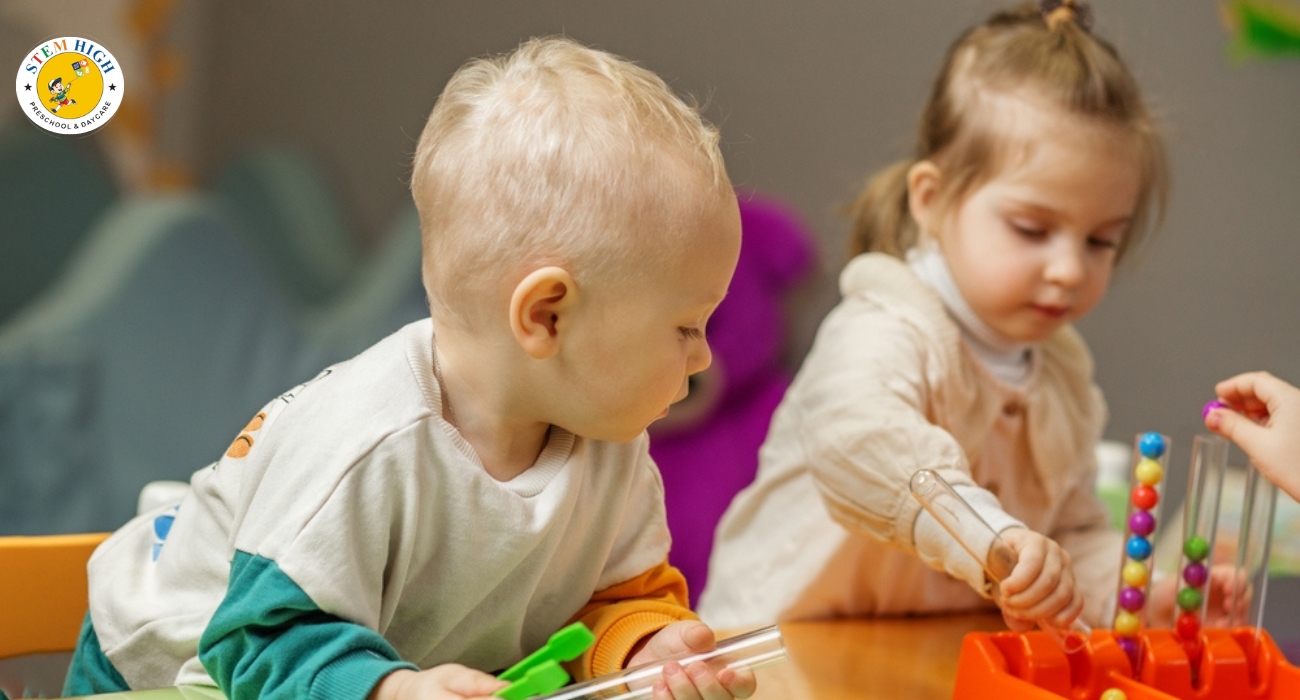STEM HIGH PreSchool
Get In Touch
Monday to Friday: 09:00am – 07:00pm
Sunday: Close
Email:stemhighpreschool@gmail.com
Phone:+91 8050125666
Monday to Friday: 09:00am – 07:00pm
Sunday: Close
Email:stemhighpreschool@gmail.com
Phone:+91 8050125666

Social skills are the foundation of successful interactions and relationships throughout life. For young children, developing these skills early on is crucial for their emotional well-being and future success in various environments, including school, home, and social settings. Fostering social skills in young children is not only about teaching them to share or take turns but also about helping them understand emotions, communicate effectively, and build empathy. This blog explores comprehensive strategies to nurture these essential skills in young children.
1. Understanding the Importance of Social Skills in Early Childhood
Social skills are the tools that allow individuals to interact effectively and harmoniously with others. For young children, these skills include sharing, cooperating, taking turns, listening, expressing emotions, and understanding others’ feelings. Developing these skills early helps children navigate social situations, build friendships, and resolve conflicts peacefully. Moreover, children with strong social skills are more likely to have better academic performance, self-esteem, and mental health.
Early childhood is a critical period for social development. During this time, children’s brains are highly adaptable and responsive to social experiences. Positive interactions with caregivers, peers, and educators lay the groundwork for future social competence. Therefore, it’s essential for parents, teachers, and caregivers to actively promote social skills in young children.
Children learn by observing the behavior of adults and peers around them. Modeling positive social behavior is one of the most effective ways to teach social skills. When adults demonstrate kindness, empathy, and effective communication, children are more likely to imitate these behaviors.
Social skills develop through practice. Providing children with ample opportunities to interact with peers and adults in various settings is essential.
Emotional intelligence is a key component of social skills. It involves recognizing and managing one’s emotions and understanding the emotions of others.
Effective communication is at the heart of strong social skills. Teaching children how to express themselves clearly and listen to others is vital.
Empathy—the ability to understand and share the feelings of others—is a cornerstone of social interaction. Fostering empathy in young children helps them build stronger relationships and develop a caring attitude towards others.
Children need to understand the social norms and boundaries that guide acceptable behavior. Setting clear expectations helps them navigate social situations more effectively.
Some children may face challenges in developing social skills due to shyness, anxiety, or other factors. It’s important to address these challenges early to prevent them from becoming barriers to social success.
Play is a powerful tool for developing social skills in young children. Through play, children learn to interact with others, negotiate roles, and practice empathy.
Educators play a crucial role in promoting social skills in young children. In the classroom, teachers can create an environment that supports social development and encourages positive interactions.
a Positive Classroom Culture**: Teachers can foster a classroom culture that emphasizes respect, cooperation, and kindness. This can be achieved by setting clear expectations for behavior, modeling positive social interactions, and encouraging students to support one another.
Social skill development is an ongoing process that requires consistent support and reinforcement.
Fostering social skills in young children is one of the most important investments you can make in their future. By providing them with the tools to interact positively with others, you’re helping them build a foundation for success in all areas of life—academically, professionally, and personally.
The strategies outlined in this blog—from modeling positive behavior and creating opportunities for social interaction to teaching emotional intelligence and promoting play—are all essential components of social skill development. Remember that every child is unique, and their social development will progress at their own pace. Patience, consistency, and encouragement are key to helping them navigate this important journey.
As children develop strong social skills, they become more confident, empathetic, and capable individuals who can build healthy relationships and contribute positively to their communities. By fostering these skills early, you’re setting them on a path to a fulfilling and successful life.